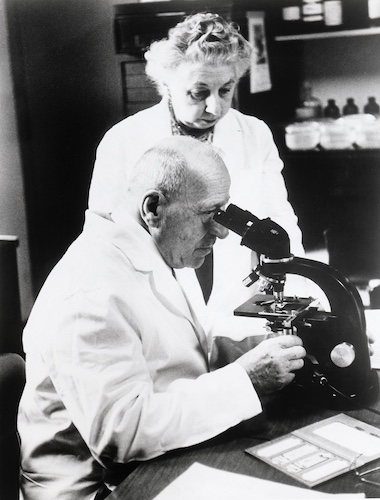Communiqué
Discover the story of the fight against cervical cancer in “The Cancer Detectives” on AMERICAN EXPERIENCE – March 26 at 9 pm
< < Back toAmerican Experience The Cancer Detectives
Premieres Tuesday, March 26, 2024 at 9 pm on PBS and Streaming on PBS.org
New Documentary Tells the Story of the Remarkable Team Responsible for the Life-Saving Cervical Cancer Test

Credit: American Cancer Society
The story of how the life-saving cervical cancer test became an ordinary part of women’s lives is as unusual and remarkable as the coalition of people who ultimately made it possible: a Greek immigrant, Dr. George Papanicolaou; his intrepid wife, Mary; Japanese-born artist Hashime Murayama; Dr. Helen Dickens, an OBGYN in Philadelphia; and an entirely new class of female scientists known as cyto-screeners. But the test was just the beginning. Once the test proved effective, the campaign to make pap smears available to millions of women required nothing short of a total national mobilization. The Cancer Detectives tells the untold story of the first-ever war on cancer and the people who fought tirelessly to save women from what was once the number one cancer killer of women. Directed by Amanda Pollak and Gene Tempest, and executive produced by Cameo George, The Cancer Detectives premieres on American Experience on Tuesday, March 26, 2024, 9:00-10:00 p.m. ET on PBS, PBS.org and the PBS App.
In the 1920s, cervical cancer was deeply feared, little discussed, and responsible for some 40,000 deaths of American women a year. There was little doctors could do once the cancer was detected. As historian Barron Lerner, MD, explains, “The notion of trying to find cervical cancer early wasn’t on anyone’s radar screen, because nobody had thought of it before, and nobody thought there was a way to do that.”
Enter Dr. George Papanicolaou — known as “Dr. Pap” — and his wife, Mary, who worked as his technician and lab manager. While studying the cellular changes that happen during the reproductive cycle of guinea pigs at Cornell Medical College, Dr. Pap discovered that by examining cervical swabs under the microscope, he could see changes in cancerous cells. When he needed to see if these changes would be similarly detectable in human females, Mary volunteered for the first Pap tests.
When Dr. Pap presented his findings in 1928, the medical community ignored the new test’s potential, and for more than a decade, the pap smear languished. Then, beyond the world of white coats and lab microscopes, attitudes towards cancer began to shift.

Credit: Courtesy of Jayne Henderson Brown
By the late 1930s, a new generation of activists — most of them women — were fighting to make cancer a part of the national conversation. Members of the Women’s Field Army, an offshoot of the recently founded American Society for the Control of Cancer (ASCC), mobilized to bring the gospel of cancer detection directly to American families. Soon, the Cornell Medical College urged Dr. Pap to return to his work on the pap smear.
Dr. Pap brought on the gifted scientific illustrator Hashime Murayama to depict the evolution of cancer across cervical cells, a vital step for explaining and teaching the technique of evaluating the tests on a mass scale. After the outbreak of WWII, Murayama was arrested and interned as a Japanese “alien,” and the fate of the project seemed once again in jeopardy until the Attorney General of the United States, Francis Biddle, stepped in to free Murayama. As the war ended, the ASCC became the American Cancer Society, fully rebranded and ready for a new fight. Their dream was to launch the pap smear across the country. Still, getting the smear out of the lab and into the real world required an unprecedented health campaign and a new kind of medical activist.

Credit: American Cancer Society
Dr. Helen Dickens, a trailblazing African American OBGYN in Philadelphia who’d fought the odds to become a doctor in the 1930s, now made it her mission to make sure that Black women had access to the life-saving test. Her tireless campaign — from workshops across the city to free Pap smears at churches to teaching hundreds of other Black doctors how to perform the test — shows how many hurdles had to be overcome before the pap smear could become an accepted part of American women’s lives.
By the late 1950s, the Pap test was triumphant. It had taken more than three decades, but the Pap smear became a routinely accepted part of women’s healthcare. And by some estimates, the test has saved more than one million lives.
American Experience The Cancer Detectives will stream for free simultaneously with broadcast on all station-branded PBS platforms, including PBS.org and the PBS App, available on iOS, Android, Roku, Apple TV, Amazon Fire TV, Android TV, Samsung Smart TV, Chromecast and VIZIO. The film will also be available for streaming with closed captioning in English and Spanish.

